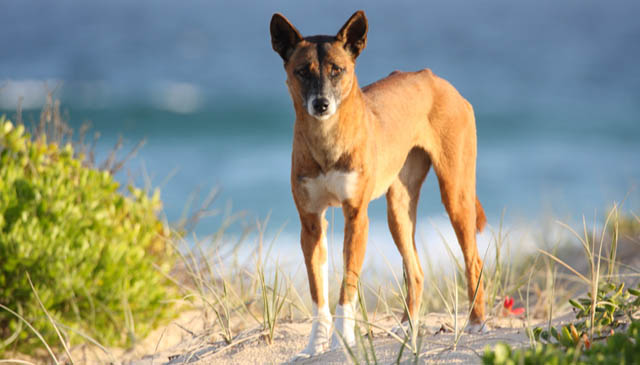An international team of researchers has proposed to conduct a large-scale project in Australia, where populations of some native predators are allowed to re-colonize habitats where they once occurred as a way of restoring fragile ecosystems and conferring resilience against globally threatening processes.

Canis lupus dingo (australian-wildlife.com)
The study, published in the journal Trends in Ecology and Evolution, argues that apex predators such as the dingo and Tasmanian devil can help ecosystems buffer against or ameliorate significant environmental challenges, including climate change, biological invasions and disease transmission.
“I acknowledge this is a pretty radical argument and there are some negative effects that must be addressed but we believe it is something land managers need to consider, desperate times need bold measures,” said Dr. Euan Ritchie of the Deakin University, Australia, a lead author on the study. “Australian ecosystems have become fragile and degraded and had a low ability to respond to challenges mainly due to the loss of native species, the functions they fulfilled, the loss of biodiversity, the invasion of pests and the consequent changes this wreaked on habitat.”
“In the Australian tropics alone, more than 20 native species of mammal might face extinction over the next few decades owing to inappropriate fire regimes, livestock grazing and predation by feral cats,” the researcher explained. “The recent introduction of the red fox into Tasmania and the decline of the native apex predator – the Tasmanian devil – is predicted to cause extinction of many species formerly abundant on mainland Australia and Tasmania.”
“We would argue that this grave situation justifies seriously considering management programs where apex predators are reintroduced or allowed to re-colonize habitats where they once occurred.”
The team also outlined experiments specifically designed to clarify the ecological roles of predators and their potential utility in ecosystem restoration.
Dr. Ritchie noted that recent evidence suggested that the reintroduction of dingoes would produce a cascade of benefits by limiting native and introduced herbivores and exotic predators.
“This would also have a profound flow on effect for other smaller species and vegetation,” he said.
The researcher acknowledged some livestock producers would have concerns about the potential impact of the predators on their stock. “But, we believe that livestock guardian animals present a viable option for protecting stock against these apex predators, they may also help deter smaller predators like cats and foxes.”
“Apex predators could in some circumstances increase the risk to threatened or endangered prey species, particularly those living in habitats already degraded by humans,” Dr. Ritchie said. “In areas where the risk to threatened species is too great it would be worth considering management that simulates the apex predators’ effects on the local habitat.”







